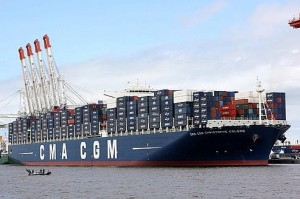
(AFP File Photo)
Egyptian non-petroleum exports hiked by 12% in the past 11 months to register EGP 134.7bn, up from EGP 120.7bn in the corresponding period last year, according to Minister of Industry and Foreign Trade Mounir Fakhry Abdel Nour.
According to an official statement from the ministry, this increase represents 93% of the country’s target to double exports.
The minister had announced in July after meeting with heads of export councils that a plan had been reviewed to boost industrial exports to EGP 145bn in 2014.
Abdel Nour attributed this rise to the increase in the number of export councils, the statement said.
He also asserted that the ministry would work during the next phase on implementing plans to support exporters in various production sectors.
The remarkable increase in industrial exports is owed in large part to a significant rise in Food Export Council exports to EGP 18.2bn, up from EGP 15.8bn in the same period last year.
The Agriculture Export Council’s exports meanwhile jumped from EGP 9.1bn to EGP 12.5bn, while ready-made garments’ exports increased from EGP 7.8bn to EGP 8.8bn.
However, exports of building materials have slumped from EGP 32.6bn in the corresponding period last year to EGP 29.7bn until November.
Regarding the destination of exports, Saudi Arabia ranked as the primary outlet for Egypt’s exports, registering EGP 12.8bn in exports from January to November, compared to 10.8bn in the same period in 2012.
Turkey came in second, having imported EGP 9.2bn worth of goods from Egypt this year, compared to EGP 6.7bn last year. This is followed by Italy, where exports valued at EGP 8.2bn were directed, up from EGP 6.6bn in 2012.
Meanwhile, exports to the United States decreased to EGP 7.7bn until November, down from 8.8bn in the same period last year.
According to the statement, Arab countries represented the most important market for Egyptian exports, valued at EGP 56.3bn with a 15% increase from last year.
The minister earlier noted that increasing the rate of exports sits at the top of the government’s priorities over the coming period, as they represent a primary generator of both foreign currency and job opportunities.




